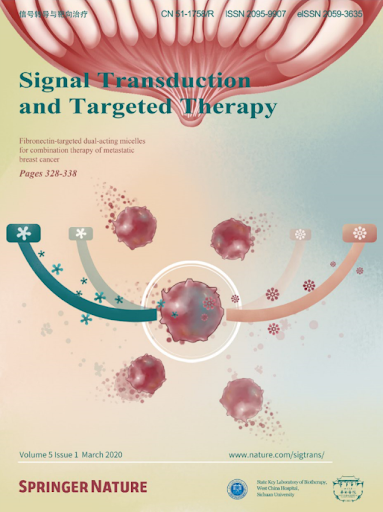Multiple sclerosis: molecular pathogenesis and therapeutic intervention.
IF 52.7
1区 医学
Q1 BIOCHEMISTRY & MOLECULAR BIOLOGY
引用次数: 0
Abstract
Multiple sclerosis is a chronic immune-mediated disorder of the central nervous system characterized by demyelination, axonal loss, and neuroinflammation, culminating in progressive neurological disability. Despite significant advances in understanding its immunopathogenesis, current immunotherapies remain limited in their ability to halt disease progression, making multiple sclerosis incurable and highlighting the critical need for novel therapeutic strategies. Antigen-specific immunotherapy represents a groundbreaking approach that aims to restore immune tolerance to myelin-derived antigens while preserving the protective functions of the immune system. Unlike broad immunosuppressive strategies, antigen-specific immunotherapy offers the potential for highly targeted modulation of pathogenic immune responses, reducing off-target effects and enhancing safety profiles. Over the last two decades, preclinical studies and clinical trials have explored diverse antigen-specific immunotherapy modalities, ranging from peptide-based vaccines to nanoparticle platforms, each aimed at achieving durable tolerance in multiple sclerosis. This review provides a comprehensive overview of multiple sclerosis, covering its etiology, clinical features, pathogenesis, pathology, and current therapeutic approaches. Thus, it delves into the current state of antigen-specific immunotherapy research, critically examining its successes and limitations while addressing the translational challenges that must be overcome to realize its therapeutic potential. By integrating insights from immunology, biotechnology, and translational medicine, we propose directions for advancing antigen-specific approaches in the quest for transformative multiple sclerosis therapies.多发性硬化症:分子发病机制及治疗干预。
多发性硬化症是一种慢性免疫介导的中枢神经系统疾病,以脱髓鞘、轴突丧失和神经炎症为特征,最终导致进行性神经功能障碍。尽管在了解其免疫发病机制方面取得了重大进展,但目前的免疫疗法在阻止疾病进展方面的能力仍然有限,这使得多发性硬化症无法治愈,并突出了对新治疗策略的迫切需求。抗原特异性免疫疗法代表了一种突破性的方法,旨在恢复对髓鞘源性抗原的免疫耐受,同时保留免疫系统的保护功能。与广泛的免疫抑制策略不同,抗原特异性免疫疗法提供了高度靶向调节致病性免疫反应的潜力,减少脱靶效应并提高安全性。在过去的二十年中,临床前研究和临床试验探索了多种抗原特异性免疫治疗方式,从基于肽的疫苗到纳米颗粒平台,每一种都旨在实现多发性硬化症的持久耐受性。本文综述了多发性硬化症的病因、临床特征、发病机制、病理及目前的治疗方法。因此,它深入到抗原特异性免疫治疗研究的现状,批判性地检查其成功和局限性,同时解决必须克服的转化挑战,以实现其治疗潜力。通过整合免疫学、生物技术和转化医学的见解,我们提出了在寻求变革性多发性硬化症治疗中推进抗原特异性方法的方向。
本文章由计算机程序翻译,如有差异,请以英文原文为准。
求助全文
约1分钟内获得全文
求助全文
来源期刊

Signal Transduction and Targeted Therapy
Biochemistry, Genetics and Molecular Biology-Genetics
CiteScore
44.50
自引率
1.50%
发文量
384
审稿时长
5 weeks
期刊介绍:
Signal Transduction and Targeted Therapy is an open access journal that focuses on timely publication of cutting-edge discoveries and advancements in basic science and clinical research related to signal transduction and targeted therapy.
Scope: The journal covers research on major human diseases, including, but not limited to:
Cancer,Cardiovascular diseases,Autoimmune diseases,Nervous system diseases.
 求助内容:
求助内容: 应助结果提醒方式:
应助结果提醒方式:


